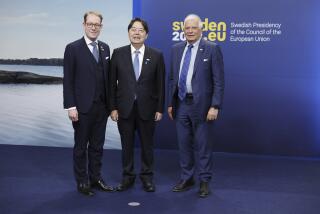Koizumi Voices ‘Deep Remorse’
- Share via
TOKYO — Trying to calm a virulent nationalist debate with Japan’s neighbors, Prime Minister Junichiro Koizumi reiterated his country’s “feelings of deep remorse” for the suffering it inflicted during its imperial era, telling an audience of foreign leaders in Jakarta, Indonesia, on Friday that Japan remains committed to acting peacefully with a “heartfelt apology always engraved in mind.”
Koizumi repeated the official policy of regret for his country’s militarist past on the eve of a meeting with Chinese President Hu Jintao, which Japanese officials hoped would calm tensions between the two Asian powers.
Clashing territorial claims and conflicting views over shared history have picked at emotional scabs in the region in recent weeks, leading to violent anti-Japan demonstrations in China and sharp exchanges with East Asian leaders.
The downward spiral of relations between two of the world’s main economic pistons has alarmed other capitals, and Koizumi’s apology was widely regarded in Japan as a move also to ease the jitters of foreign leaders and financial markets.
His language stuck closely to the declaration by Prime Minister Tomiichi Murayama in 1995 on the 50th anniversary of the end of World War II. That apology is regarded in Tokyo as the strict diplomatic template for expressing Japanese regret.
Such apologies from Japan are infrequent, and Koizumi’s decision to issue one Friday at a gathering of Asian and African leaders was an attempt to stanch further damage to his country’s international image.
A dispute over the degree of Japan’s remorse for its past has arisen at a time when Tokyo is aspiring to play a more assertive global role. But Japan has seen its bid for a permanent seat on the United Nations Security Council stumble because of suggestions that the country is unwilling to adequately atone for its 20th century wartime atrocities.
Using an international forum for emphasis, Koizumi stated that “in the past, Japan, through its colonial rule and aggression, caused tremendous damage and suffering to the people of many countries, particularly to those of Asian nations.
“Japan squarely faces these facts of history in a spirit of humility,” he said.
Whether a repetition of the long-standing apology can mollify Japan’s neighbors remains uncertain. As Koizumi spoke in Jakarta, more than 80 members of his ruling Liberal Democratic Party made an official visit to the Yasukuni Shrine in Tokyo. The memorial honors 2.6 million Japanese war dead, including 14 convicted Class A war criminals executed by an allied tribunal after World War II.
Such pilgrimages outrage Japanese pacifists and the nations that were victims of the Imperial Army’s marauding sweep across Asia.
Koizumi has visited Yasukuni four times since becoming prime minister in 2001, a defiance of outside opinion that is regarded as a barometer of Japanese nationalism.
Moreover, he has promised to return this year.
As a result, many in China described Koizumi’s apology Friday as an act driven by political expediency rather than any heartfelt reflection on his country’s militarist history.
“Koizumi’s apology has very little significance at all,” said Toh Lam Seng, a visiting professor of international relations at Peking University. “The real issue is not simply an apology. It’s real action.”
For many Chinese, Japanese leaders continue to send mixed messages about their history. Toh said prime ministers continued to visit Yasukuni after Murayama’s 1995 declaration of sorrow. Also, Koizumi did not distance his government from a new Japanese junior high school history textbook that has aroused outrage in China, as well as in North and South Korea, by either avoiding or sanitizing accounts of Japan’s wartime atrocities.
Yang Dongliang, head of the Institute of Japanese Studies at Nankai University in Tianjin, said that though China welcomes Friday’s apology, it was not clear how much it would repair relations in the long run. “The same kind of gesture was made by Japanese leaders before,” he said.
By contrast, some conservative voices in Japan seized on Koizumi’s statement of formal contrition as a sign of weakness. His move was criticized by some nationalist media groups, which lamented Japan’s readiness to apologize -- again -- for its imperial actions in an imperial age.
“Japanese people will see this as Koizumi compromising, that he gave in to China,” said Kenichi Matsumoto, a prominent nationalist writer and historian. “They will see it as a negative.”
But others argued that Koizumi’s real audience was not China -- where deep-seated anti-Japan instincts are hardly likely to be soothed by another apology, they say -- but the rest of the world, which fears the consequences of a meltdown in relations between the two Asian powers.
China and Japan are each other’s largest trading partners -- exchanging a total of $208 billion in goods and services last year, nearly double the total of five years ago -- while also competing for Asian markets and scarce energy resources. Japanese technology and investment grease the Chinese boom, whose gusts of growth have lifted Japan out of its 12-year economic malaise.
Both countries also continue to underwrite the U.S. economy as the largest foreign holders of American dollars.
“Koizumi was addressing the fundamental worry of a worldwide audience that says don’t shake the boat,” said Takashi Inoguchi, a political science professor at Tokyo University. “Together, Japan and China can shock the U.S. economy, and the recent disturbing messages are not wanted by anyone. This was a global worry that needed to be taken care of.”
*
Staff writer Mark Magnier of The Times’ Beijing Bureau contributed to this report.
More to Read
Sign up for Essential California
The most important California stories and recommendations in your inbox every morning.
You may occasionally receive promotional content from the Los Angeles Times.










